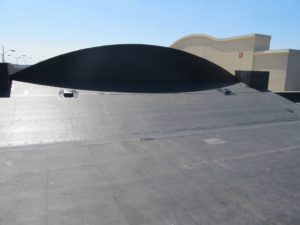While a steel house may still sound like something from a science fiction movie, a steel roof is becoming a more and more common feature in contemporary architecture. Durable, lightweight, and modern looking, metal roofs – whether made from steel, aluminum, or other metal roofing materials – have gained increasing popularity among present-day designers, builders, and property owners and are frequently installed in both new construction and roof replacement projects.

Metal roofing can indeed be an excellent choice for any residential or commercial building for the following reasons:
- Longer lifespan-lasting
- Energy-efficient
- Environmentally friendly
- Modern
If you’re considering a metal roof for your home or business establishment, however, you need to be well aware of both the numerous advantages and notable drawbacks of this particular roofing material.
Here is a comprehensive list of metal roofing pros and cons to help you make an informed decision about your roofing project and get the maximum benefit from your choice.
Pros of Metal Roofing
Metal outperforms traditional roofing materials, such as asphalt, wood, and tile, in several important aspects:
1. Longer Lifespan
While asphalt shingles and other conventional roofing materials typically last 15-20 years, metal roofing life expectancy is about 40-70 years (depending on the specific product). In fact, a properly installed metal roof can last as long as the building:
Metal roofs are extremely durable:
- Metal will not crack, chip, split, dry-out, rot, or warp like other common roofing materials.
- Metal roofs can withstand high winds (up to 140 miles per hour) and thunderstorms without sustaining any damage – they feature interlocking panels that provide superior wind resistance and seal out water (unlike roofing materials that just overlap).
- Metal is not susceptible to insect or rodent infestation.
- Metal is a non-porous material and does not harbor mildew, fungus, and moss growth.
- High-end metal roofs, such as copper and zinc roofs, are considered a lifetime roofing solution.
- Most manufacturers provide a 30-50 year material warranty on their metal roofing products.
2. Ease of Installation
Metal roof installation is quick and easy:
- Most metal roofing materials come in panels or multiple-shingle sections that can be put in place very quickly.
- Metal roofing is lightweight and doesn’t need additional structural support.
- Metal roofing can be applied over existing shingles without the need for tear-off.
- Most metal roofing materials can be installed on gently pitched roofs without a risk of leaking.
3. Fire Resistant
Metal is a noncombustible material, so metal roofs can’t burn and will effectively protect your home or commercial building from wildfires and airborne sparks and embers approaching from the outside.
4. Energy Efficient
A metal roof can reduce your annual energy bills by as much as 25 percent:
- Metal surfaces reflect solar heat back into the atmosphere instead of absorbing it inside. This reflective property allows homeowners and businesses to save up to 40% in cooling costs in the hot summer months.
- Most metal roofing systems have a “dead-air space” between the metal coating and the roof deck that helps increase energy efficiency in the cold season, reducing heating costs by 10-15%.
5. Weather Protection
Because of its hard and slick surface and the way the panels interlock with one another, metal roofing can easily withstand the elements and provide excellent weather protection to your home or business facility:
- Metal roofing is practically impervious to water.
- Metal roofs can survive hurricane level winds.
- The smooth metal surface sheds snow quickly and easily, helping reduce the accumulation of snow and ice on the roof and prevent potential ice dams.
- A metal roof will intercept 100% of a lightning strike that comes towards the building (unlike a lightning rod which only intercepts lightning if it happens to hit the rod) and will safely dissipate the electric charge even if it is not grounded (metal roofing will not increase the likelihood of a building to get struck by a lightning).
- The lightweight of metal roofing systems helps reduce structural movement and damage (particularly important in areas with high seismic activity).
A properly installed metal roofing system will not only minimize the risk of roof damage, but will also help reduce water damage, wind damage, and fire damage to the building. Therefore, FEMA recommends metal roofing systems in areas that are prone to natural disasters such as hurricanes, floods, earthquakes, etc.
6. Low Maintenance Costs
Because of their durability and resistance to the elements, metal roofs do not degrade quickly and incur very small expenses for roof repairs and maintenance.
7. Green Roofing Solution
Metal is a sustainable and environmentally friendly alternative to asphalt and other traditional roofing materials:
- Metal roofs can last three times as long as asphalt shingles.
- Metal roofs consist of 25% – 95% recycled material (some metal roofing systems are made of 100 percent recycled content).
- All metal roofs can be fully recycled at the end of their life.
- Metal roofing provides an ideal platform for solar panels and rainwater harvesting systems.
8. Modern Look
Metal roofing comes in an astounding array of colors, finishes, and styles and can be easily adapted to any roof and building design:
- There are four different metal roof styles – vertical metal panels with concealed fasteners such as standing seam (the most popular design), corrugated and ribbed metal panels with exposed fasteners, interlocking metal shingles, and stone-coated steel tiles.
- Metal roofing is available in more than 100 different colors (including standard, premium, and custom hues).
- Most metal roofing materials are designed to hold paint finishes very well
- Metal shingles can be manufactured to imitate the look of natural slate, clay tiles, cedar shakes, and even asphalt shingles.
- Metal roofing products are well-suited for both low and steep pitch roofs, as well as for rounded or arched roofs.
- Metal roofs have an impressive, futuristic look.
- Unlike other roofing materials that begin deteriorating from the moment of installation and start looking dull and worn out over time, metal roofing keeps its fresh, beautiful appearance for decades.
Despite the numerous metal roof advantages listed above, you can’t be certain that this particular roofing option is right for you until you find out its drawbacks.
Cons of Metal Roofs
Like every other roofing material, metal presents its own specific challenges:
1. Expensive Roofing Material
The greatest disadvantage to choosing a metal roof is the considerable initial cost of investment – metal roofing can run from $150 to $600 or more per 100 square feet (one square of material). This price range is comparable to the costs of other premium roofing materials, but higher-end metals can be about 5-10 times more expensive than asphalt shingles (the most expensive metals – copper and zinc – cost $900-$1400 per square for the material alone).
What’s more, metal roofing installation is more expensive than the installation of other types of roofing because of the specialized equipment and expert skills it requires.
So, if you’re buying a roof for a building in which you only have a short-term interest, metal roofing may not be a financially good choice. If you’ll be using the structure for a long time, however, your investment will pay off – because of the material’s long lifespan and low maintenance costs, metal roofing will actually save you money in the long run:
- A high-quality metal roof will last as long as the building, so you won’t have to pay for roof replacements every 15 years or so.
- Your huge annual energy savings will quickly add up and cover the initial cost difference.
- There will be minimal roof repair and maintenance costs.
- A properly installed metal roofing system will protect your property against water damage, wind damage, fire damage, etc., reducing potential repair and restoration costs and maintenance expenses.
2. Noisy on Contact
Water will tap on a metal roof, so it will be noisier than other types of roofing – especially during a heavy rain or hailstorm. Although some people find the sound of rain on a tin roof quite soothing, you may get irritated by the constant drumming or may not be able to sleep or work because of the excess noise.
If so, you can have a few extra layers of solid sheathing (wood planks or plywood) or insulation added beneath the metal coating during the installation process – this will reduce the drumming effect and minimize the sound heard inside, making the metal roof as quiet as an asphalt shingle roof. Keep in mind though that this extra insulation will increase the overall cost of the roof.
3. Expansion and Contraction
Metal expands and contracts as temperatures rise and fall, creating a wavy effect. Therefore, a proper fastening system is required to accommodate the movement and prevent potential damage to the metal roof during this process (otherwise, the fasteners from the roof’s framing will come loose and the metal panels will no longer be secure).
4. Prone to Denting and Marring
Metal is prone to denting and scratching and can be easily marred, so metal roofing has to be treated with great care:
- Installers need to be extremely careful when putting the roof in place.
- Softer metal roofing materials, like aluminum and copper, will be dented by large hail or falling branches. Even walking on the metal shingles may damage them.
- Some painted metal roof finishes can peel, chip, or fade over time.
- It may be necessary to hose off the roofing on a regular basis to keep it looking good.
5. Corrosion
Steel roofing can corrode over time, especially when exposed to a moist salt-spray environment such as near the coastal lines. Therefore, steel roofs need to be coated with a special protective coating to prevent corrosion (galvanized and galvalume steel roofing systems are pre-coated by the manufacturer). Aluminum, copper, and zinc roofs do not corrode and do not need to be coated.
6. Difficulty of Access
Walking on a metal roof is very difficult and dangerous, especially in wet weather – the metal surface becomes slippery and offers no traction, making it easy to skid and fall.
Besides, cutting through the roof to get into the building (during a house fire or other emergency situation) takes longer and is much more difficult when the house has a metal roof.
7. Modification Issues
Metal roof repairs and modifications are costly and difficult:
- Metal roofing materials are installed in large panels and are, therefore, more difficult to replace than individual shingles.
- Exact color matching is extremely difficult, so if a repair is required or a building extension is added after a decade or so, it may be impossible to match the material.
Roofing Contractors to Install Your New Roof

Now that you’re familiar with the most essential pros and cons of metal roofs, you can decide on the best roofing material for your project. At Reliable Roofing, we’ll be happy to provide you with any further details you may be interested in and any commercial roofing services you may need.
Each of our Reliable Roofing technicians is trained and experienced in working with multiple types of roofing material, including PVC, EPDM, sheet metal, and more. Our professionals also follow all OSHA requirements keeping your building updated and safe for all contractors. Lastly, we are fully insured up to $6 million, protecting your financial interests while providing the professional roofing services you need.
Contact us at (815) 981-9898 for a free estimate or additional information about our quality roofing services.
 We support our Troops, Police & Freedoms
We support our Troops, Police & Freedoms
